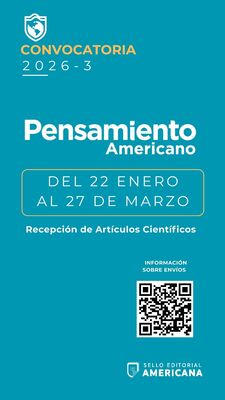Project-based pedagogy as a tool for the development of educational practices
DOI:
https://doi.org/10.21803/penamer.15.30.462Keywords:
PEDAGOGY BY PROJECTS, TEACHING ROLE, EDUCATIONAL PRACTICES, EducationAbstract
Introduction: The present research was approached to get the Pedagogy application for academic Projects (PPP) as a source to promote the development of educational practices witness' judgment that key informants offer in their own experience inside the educational ecosystem. Objective: To generate theoretical constructs about the
Pedagogy application for academic Projects as a source to promote the educational practices development. This process is boarded up on research by a subjectivist grasp.
Also, it contains the theoretical use at the time it is based on key informants' experiences, which are made up of four school teachers and two school directive executives from
two Public Educational Institutions in Medellín city. Methodology: The information gathering technique that was used was the interview in-depth. The instruments' validity was carried out through a professional review by experts. Conclusion: From that perspective, it produced a knowledge less encouraging for the Formation Processes
Status based on educational practices that do not get into familiar results with PPP, and this also gets separated from what is convenient since the Teachers' practice stages and the holistic development from academic needs that, in reality, presents the human context. In that way, the theorizing was emphasized in authorizing true positive
aspects and the real ones taken from PPPs, the same element that could help for the accomplishment of the educational goal, which is translated in the learners' realization under the complexity observation, the constructivism, and the rest of active pedagogical referring in modern times.
Downloads
References
Ausubel, N (1983). Psicología Educativa: Un punto de vista cognoscitivo. 2° Ed. Trillas México. [Documento en Línea] Disponible: https://www.academia.edu/download/36648472/Aprendizaje_significativo.pdf [Consulta: 2021 abril 03].
Corbin, J. y Strauss, A. (2002). Bases de la investigación cualitativa. Técnicas y procedimientos para desarrollar la teoría fundamentada. Medellín, Antioquia.: Universidad de Antioquia Facultad de Enfermería de la Universidad de Antioquia.
Doménech, J. (2012). Elogio de la educación lenta. Editorial Graó. Barcelona (España).
Edwars, V. Remedi, E. Tarres, M. Avila, R. (1992) Calidad de la educación y políticas de perfeccionamiento docente. [Compilación en Línea] En Consejo Latinoamericano de Ciencias Sociales (1992) Cómo aprende y cómo enseña el docente: informe de seminario. Disponible: http://biblioteca.clacso.edu.ar/Chile/piie/20170823052546/pdf_562.pdf [Consulta: 2021 julio 7]
Freinet, E. (1974). Nacimiento de una pedagogía popular. Historia de una escuela moderna. Barcelona: Editorial Laia.
Freire, P. (1967). La educación como práctica de la libertad. Montevideo: Tierra Nueva.
Gardner, H. (1997). La mente no escolarizada. Cómo piensan los niños y cómo deberían enseñar las escuelas. Editorial Paidós. Barcelona (España).
Guerrero, L. y Terrones, D. (2003). Repertorio de estrategias pedagógicas. PROMEB, Piura.
Glaser, B.; Strauss, A. (1967). The Discovery of Grounded Theory. Strategies for Qualitative Research. Hawthorne, N.Y.: Aldine.
Glaser, B (1992). Basics of Grounded Theory Analysis: Emerge vs. Forcing. California. Mill Valley, CA
Hessen, J. (1989). Teoría Del Conocimiento. Caracas, Venezuela: Editorial PANAPO.
Hurtado, J. (2010). Metodología de la investigación: guía para una comprensión holística de la ciencia. (4ª. Ed). Caracas: Quirón.
ICFES (2007). Fundamentación Conceptual Área de Ciencias Naturales. Colombia. [Documento en Línea] Disponible: http://www.colombiaaprende.edu.co/html/competencias/1746/articles-335459_pdf_2.pdf [Consulta: 2021 marzo 06]
Rodríguez, J. (2013) Una mirada a la pedagogía tradicional y humanista. [Revista en Línea] Presencia Universitaria, 3(5) pp.36-45. Disponible: http://eprints.uanl.mx/3681/1/Una_mirada_a_la_pedagog%C3%ADa_tradicional__y_humanista.pdf [Consulta: 2021 julio 7]
Jurado, F. (2017). Pedagogía, lenguaje y democracia. Bogotá: Red Latinoamericana para la Transformación de la Formación Docente en Lenguaje, 2017. 118 p. ISBN: 978-958-24-3417-5. [Libro en Línea] Disponible: http://www.lenguaje.red/docs/2020/pedagogia-lenguaje-democracia.pdf [Consulta: 2021 abril 02]
López, G (2017). Corrientes pedagógicas contemporáneas (ficha). Buenos Aires: Ministerio de Educación y Deportes de la Nación.
Mialaret, G.; Chenon, T. (1968). Educación nueva y mundo moderno. Vicens-Vives.
Muñoz, M., Rochat, M., Lozano, C., Ulloa, M., Collazos., España, G. (2019). PROYECTOS CON-SENTIDOS. Cali, Colombia: Redlenguaje.
Palacios, J. (1984). La cuestión escolar. Barcelona: Editorial Laia.
Piaget, J. (1969) Psicología y Pedagogía. Barcelona: Ariel. Libro en Línea] Disponible: http://dominiodelasciencias.com/ojs/index.php/es/article/view/298 [Consulta: 2021 abril 03]
Schunk, D. (2012). Teorías del Aprendizaje. Una perspectiva educativa, México: (6ta ed.) Pearson Educación de México, S.A
Taylor, S.; Bodgan, R. (1984). Introducción a los métodos cualitativos. España: Ediciones Paidós.
Tigse, C. (2019). El constructivismo, según bases teóricas de César Coll. [Revista en Línea] Revista Andina de Educación e-ISSN: 2631-2816. Disponible: https://revistas.uasb.edu.ec/index.php/ree/article/view/659/635 [Consulta: 2021 marzo 15]
Tobón, S. (2010). Conferencia: El modelo de competencias en las prácticas docentes: Hacia escenarios significativos de vida, Revista Suma por la Educación, vol. 1, pp. 1-3, 2010 (06/03/2021).
Unigarro M, (2017). Un modelo educativo crítico con enfoque de competencias. Bogotá: Ediciones Universidad Cooperativa de Colombia.
Downloads
Published
Versions
- 2022-10-07 (3)
- 2024-06-05 (2)
- 2022-10-10 (1)
Issue
Section
License
Copyright (c) 2022 Pensamiento Americano

This work is licensed under a Creative Commons Attribution-NonCommercial-NoDerivatives 4.0 International License.
The author or authors of an article accepted for publication in the Journal Pensamiento Americano will transfer all of the patrimonial rights to the American University Corporation free of charge, within which are included: the right to edit, publish, reproduce and distribute both print media as digital, in addition to include in article in international indexes and / or databases, likewise, the Editorial Seal is authorized to use the images, tables and / or any graphic material presented in the article for the design of covers or posters from the same magazine. By assuming the patrimonial rights of the article, it may not be partially or totally reproduced in any printed or digital media without its express permission.
AUTHORITY ASPECTS
For the Pensamiento Americano Journal, all the authors of an article have made substantial contributions to the research and the manuscript, and they share the responsibility when the article presents errors, fraud in some way or violations of copyright.
After submitting an article, the journal does not accept the addition, deletion or change in the order of the authors, in addition we reserve the right to release the article when it has been submitted to the journal and under no circumstances will American Thought accept the article. withdrawal of an article during any phase of the editorial process





